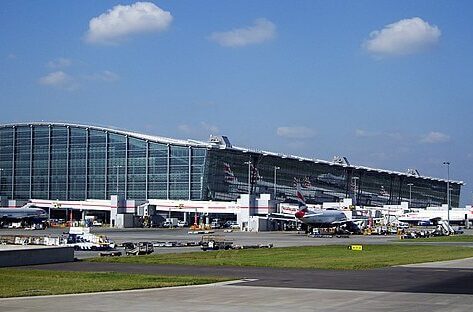
New research reveals that the planes traversing London’s six airports emit harmful nitrogen oxides and particulate matter emissions equivalent to those of 3.23 million cars annually.
In second and third are Tokyo and Dubai, facing pollution from air traffic comparable to 2.78 million cars.
These cities top the list of locations worst affected by aviation-related air pollution, according to the 2024 Airport Tracker, a study tracking emissions from cargo and passenger flights worldwide.
The analysis, conducted by the global affairs think tank ODI in collaboration with T&E, covers 1,300 airports and includes both carbon emissions and pollutants such as nitrogen oxides (NOx) and fine particulate matter (PM2.5).
Shockingly, the top 20 airports collectively emit as much carbon as 58 coal-fired power stations.
“Pollution around airports is growing year on year,” said Jo Dardenne, the aviation director at Transport & Environment, the thinktank which helped produce the research. “It affects millions of people, who breathe in toxic emissions and develop health conditions as a result, yet policymakers are brushing the problem under the carpet.
“Exponential growth of the sector and airports is incompatible with their climate goals, especially considering the slow uptake of clean technologies. The sector led us to believe that they would bounce back better after the pandemic. They’ve certainly bounced back – but without action, the sector’s climate and health impact isn’t going to get any better.”
Dubai International Airport ranked as the most polluting airport overall, with annual CO2 emissions of 20.1 million tonnes, equivalent to the emissions of five coal plants.
Heathrow Airport ranks second for climate impact, emitting 19.1 million tonnes of CO2 per year. However, it leads in NOx emissions, with 5,844 tonnes annually, while its PM2.5 emissions are lower, ranking 16th.
Despite these alarming figures, the correlation between airports’ climate impacts and emissions of other pollutants remains complex.
Critics argue that current regulations inadequately address the diverse pollution caused by airports, highlighting the need for more stringent safeguards.
“Aircraft noise levels are continuously exceeded, and we completely lack EU standards on ultrafine particles, which are a major health hazard,” said Magdalena Heuwieser, of the activist network Stay Grounded.
“Some key measures must be taken immediately to protect the health of workers and communities surrounding airports – like night flight bans, or simple jet fuel improvements to have at least the same standards as car fuel. But technology won’t solve the whole problem: a reduction of the number of flights is most effective and needed.”
Sam Pickard, a research associate at ODI, said: “Airports are long-term infrastructure, so choices now affect climate and air quality far into the future. More has to be done to recognise these impacts and limit expansion in many parts of the world.”
——————————————————————————
At Natural World Fund, we are passionate about stopping the decline in our wildlife.
The decline in our wildlife is shocking and frightening. Without much more support, many of the animals we know and love will continue in their decline towards extinction.
When you help to restore a patch of degraded land through rewilding to forests, meadows, or wetlands, you have a massive impact on the biodiversity at a local level. You give animals a home and food that they otherwise would not have had, and it has a positive snowball effect on the food chain.
We are convinced that this is much better for the UK than growing lots of fast-growing coniferous trees, solely to remove carbon, that don’t actually help our animals to thrive.
This is why we stand for restoring nature in the UK through responsible rewilding. For us, it is the right thing to do. Let’s do what’s right for nature!
Donate today at https://naturalworldfund.com/ and join in the solution!

